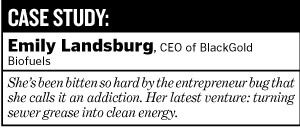

EMILY LANDSBURG started and sold her first company, a business taking care of people's boats, when she was just a few years out of college.
"Nothing was easy about it," she says. "It wasn't an instant success." Even after she and her partner made their first hire, Landsburg was still waitressing and working odd jobs to help pay her rent.
Then, from the restaurant window one day, she caught a glimpse of their employee working on a client's boat. In an epiphany, she realized that out of thin air she had created a job. "I was just, like, oh my god, this is the coolest thing ever." She was hooked on entrepreneurship.
Now 32, she's rounding up financing - she's after $800,000 from angel investors and venture capitalists - to move her second start-up, a clean-energy company called BlackGold Biofuels with four employees, out of the R&D stage and into commercialization nationally. After years of research in a North Philly industrial plant, the company has developed the technology to remove grease from municipal water systems and turn it into biodiesel fuel.
BlackGold is now at work on its first large-scale demonstration project, for the San Francisco Public Utilities Commission, which will use the rehabilitated sewer scum to power vehicles in the water department's fleet. Landsburg is also in talks with other municipal water authorities, including Philadelphia's. Her company's annual revenues last year were $1.4 million, and she expects the firm to turn its first profit next year.
The compared-to-those-other-guys school of entrepreneurship: Landsburg studied math in college at Columbia University. Although most of her classmates dutifully marched from the math department straight downtown to jobs on Wall Street, she'd never thought of herself as a business type.
"Honestly, it was one of those things where I really never even considered it. . . . I was really interested in fluid dynamics, aerodynamics and naval architecture. I love to sail."
Then, at her first job, doing mathematical modeling for a start-up firm that designed racing sailboats, she realized that while she'd been good at learning math, "I was terrible at doing math."
It also occurred to her that her employers were terrible at running a business. "It was going down the tubes," she says.
Then, it hit her: "I could run a company."
The entrepreneurial theorem - X=X+1: At her own boat-tending start-up, in Rhode Island, Landsburg came to think of creating a new company as a thrilling breach in the first law of thermodynamics.
"In math and physics, there are very strict rules," she says. "It's a zero-sum game. Matter is neither created nor destroyed.
"And here I was, we had created this job, and it didn't take away from another job somewhere else. And we created value. That was incredibly seductive."
Company-runners' high: Of entrepreneurship, she says, "I've come to think of it as sort of an addiction."
"It's like those people who run huge long-distance races. You look at them, and you ask: 'Why are you doing that? It's so painful.'
"And they're like: 'I love it.' "
From sailboats to sewer grease: As much as she loved boats, Landsburg was also keen on renewable energy. After she sold the boat business to her partner, she was lured by her boyfriend (now her husband) to Philadelphia, where she worked at the Energy Cooperative developing a distribution system to sell biodiesel fuel for fleet vehicles.
Thanks to her strategic planning, biodiesel fuel derived from renewable resources like soybean oil has a stronger presence around the region than you might imagine. "The Philadelphia Eagles run their field-maintenance vehicles on it," she notes.
BlackGold started as a project within the Energy Cooperative, then spun off as a separate venture. Landsburg became CEO in 2008.
Next steps: Having come up with a commercially viable technology for turning sewer muck into fuel, "We're raising equity to be able to build our team to go out and recognize the opportunity that's before it," Landsburg says.
"That's part of the entrepreneurial addiction. You're constantly right around the corner. You hit your milestone, and then there's about a minute-and-a-half of sitting down and taking a deep breath - and there's an immediate draw to the next milestone. You're really energized by that."
Her E-Class friends-and-family network: BlackGold has tapped into the U.S. Small Business Administration's Small Business Development Centers at both Temple University and the University of Pennsylvania for business advice and consulting. Landsburg and her employees also collaborate regularly with four scientists at the U.S. Department of Agriculture for help on technical matters.
"I think most people don't even realize that the federal government partners with commercial businesses," Landsburg says.
Last but not least, there's her husband, Michael, providing "both emotional and practical support - like making dinner," she says. "Behind every strong entrepreneur is a stronger partner. I owe him a huge thank you."
Got sleep?: The couple's personal startup venture is their 7-week-old baby, Max.
"His latest milestone is that he slept for a five-hour stretch - not last night, but the night before," Landsburg said last week.
"We're trending in the right direction.



